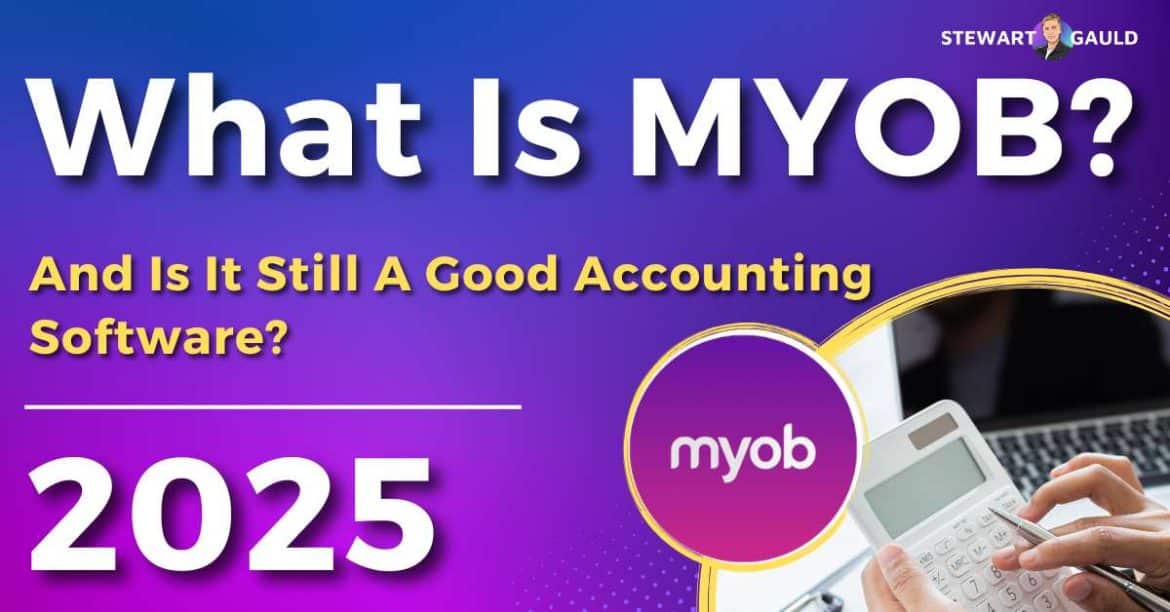In this ‘What is MYOB’ article, I share whether MYOB is still a good accounting software for small businesses.
If you’ve been searching for the perfect accounting software to manage your business finances effectively, you’ve likely come across MYOB.
MYOB has been a trusted name in the accounting world for decades, helping millions of small teams streamline their accounting and bookkeeping processes.
But can it still compete with the large influx of innovative and feature-rich accounting software available today? That’s what I’m here to find out!
In this post, I’ll take a closer look at what MYOB is, how it’s evolved, and whether it still remains a smart choice for small teams seeking reliable financial management tools.
What is MYOB?
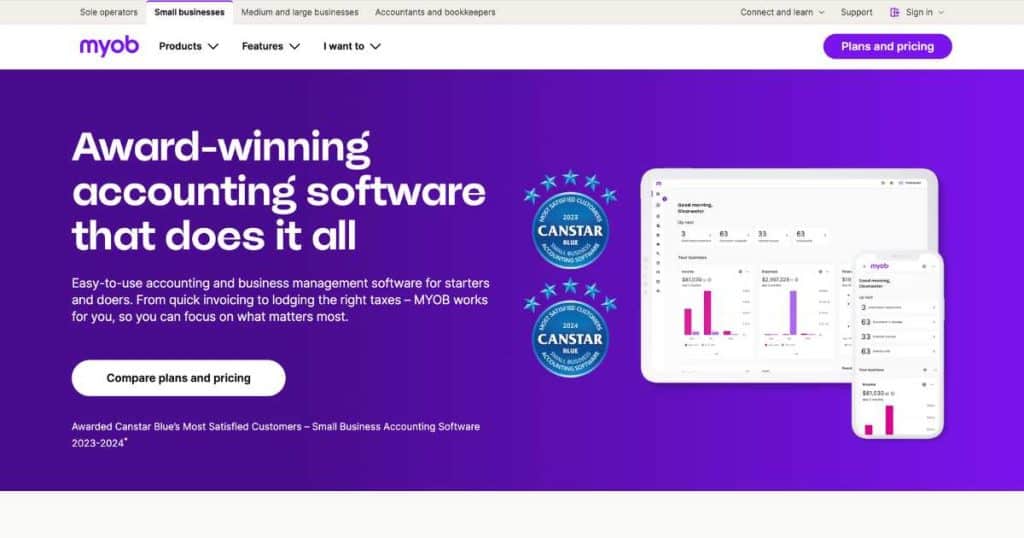
Short for ‘Mind Your Own Business,’ MYOB is an Australian-born online accounting software designed specifically for small businesses and sole traders.
True to its name, MYOB essentially gives business owners the tools they need to control their finances in one place.
Once a purely desktop-based application, MYOB has since evolved into a modern cloud-based platform that allows you to manage your finances anytime, anywhere.
From tax and expense management to invoicing, payroll, inventory, and more, MYOB ensures you stay on top of your business finances with ease.
These integrated features help you manage your day-to-day operations, simplify your financial tasks, and maintain a clear view of your business’s performance at all times.
Read more: Top 3 Bookkeeping Software For E-Commerce.
MYOB Ease Of Use
One of MYOB’s standout strengths is just how user-friendly it is, even if you’re not a numbers person!
MYOB is designed to simplify the complexity associated with accounting, guiding you every step of the way through helpful in-app modules and support articles.
Plus, everything is available in one place, adding to its ease of use.
From payroll and inventory to expense management, reporting, and more, you no longer need to jump between multiple tools for your accounting needs!
And its intuitive interface makes navigating various financial tasks far less overwhelming, whether sending invoices, running payroll, or reconciling bank transactions.
Overall, MYOB is pretty easy to use. However, compared to accounting software like Xero, MYOB’s more traditional interface can feel less intuitive or a bit harder to navigate for some.
Read more: Top 5 Bookkeeping Software For Sole Traders.
MYOB Pricing
MYOB’s flexible pricing plans have been designed to suit businesses at different stages of their journey, from solo entrepreneurs to growing companies.
The platform’s pricing plans are as follows:
- MYOB Solo: $5.50 monthly. Mobile app for sole traders or freelancers.
- Business Lite: $17 monthly. For teams with a maximum of 2 employees.
- Business Pro: $31.50 monthly. Best for small or medium-sized businesses with a team.
- Business AccountRight Plus: $75 monthly. Ideal for bigger teams that require unlimited features, tools, and support.
- Business AccountRight Premier: $97.50 monthly. Best for teams that require multi-currency capabilities or those with complex needs.
Note: These are MYOB’s current promotional pricing monthly costs (June 2025) , and the price may differ once the promotional period ends.
I highly suggest checking the MYOB website for the current pricing costs.
Additionally, MYOB offers a ‘Payroll only’ plan for $9 per month for those who simply require a standalone payroll and tax-compliant service (up to 4 employees only).
MYOB Key Features
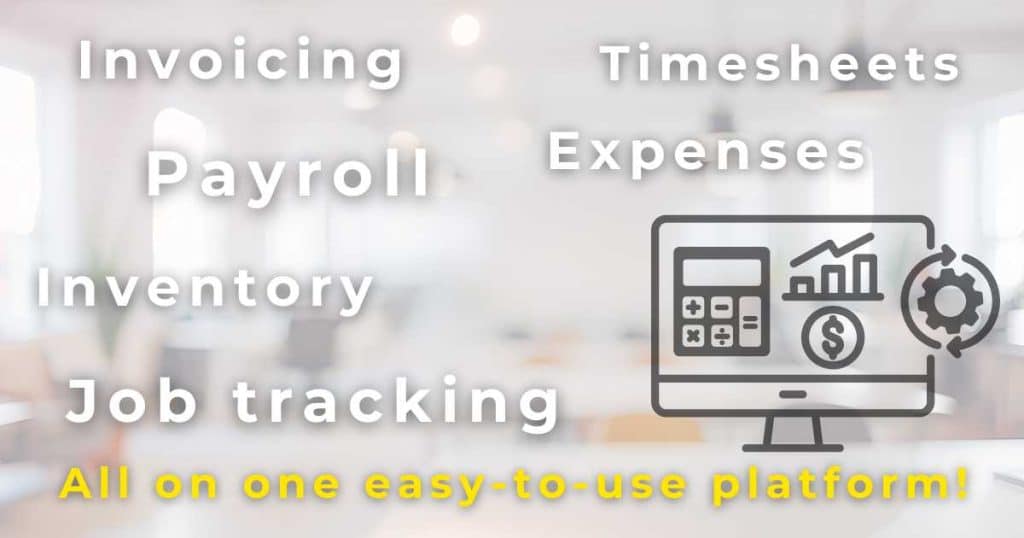
As an all-in-one accounting software, MYOB claims it can help you with all your small business needs.
So, what exactly does MYOB bring to the table? Let’s take a closer look at its key features now.
Invoicing
Do you want to quickly create, send, and track invoices and quotes from your desktop or mobile device? Well, thanks to MYOB’s built-in invoice creation tool, you can!
MYOB’s integrated invoicing feature is designed to make getting paid faster and managing billing effortless.
How does it work? It’s simple, really.
Design your very own invoice or quote template with your unique logo and brand colors and start delivering professional and accurate invoices to your clients effortlessly!
You can even leverage smart automation features like:
- GST and line-item calculations.
- Recurring invoice capabilities.
- Payment reminders, and more.
These intuitive automatic tools help save time and reduce finance-related admin.
Invoices can be sent instantly via text or email, and customers can pay through a wide range of methods, including credit cards, PayPal, Apple Pay, Google Pay, and more.
To stay on top of cash flow, MYOB even enables you to connect your bank account!
And to top it all off, you can track expenses linked to specific jobs for more detailed reporting.
For sole traders on the move, the ‘Solo by MYOB’ plan offers Tap to Pay functionality, allowing you to accept in-person payments directly from your mobile device.
This head-to-toe invoicing feature basically helps you send professional invoices, get paid quicker, and stay in control of your business finances with minimal effort!
Read more: Xero Invoicing Review.
Payroll and Timesheets
Thanks to MYOB’s payroll and timesheet management tools, you can wave goodbye to the stress of payday and say hello to a smart and streamlined payroll solution!
Designed with growing businesses in mind, MYOB handles everything from your tax to rosters, timesheets, and more in one place.
It completely automates complex payroll calculations such as tax, superannuation, and leave for you, and flags potential errors before they become problems.
MYOB also supports Single Touch Payroll (STP) reporting directly to the ATO, ensuring you’re always compliant without needing end-of-year group certificates.
Better yet, new employees can securely onboard themselves by submitting their details online. All you need to do is input their name and email!
And if you have multiple employees, you’ll be pleased to know that MYOB’s built-in timesheet feature has you covered.
This feature essentially simplifies staff management and makes payroll easier and faster for you and your employees.
With built-in time tracking and rostering tools, businesses gain clear visibility into who’s working, when, and where.
Employees can clock in and out from their mobile devices using the MYOB Team app, giving managers real-time updates on attendance, late starts, or breaks.
And creating and publishing rosters is just as easy, with intuitive scheduling tools that let you customize shifts with start times, end times, and break periods.
These tools also sync directly to your MYOB Business software for seamless payroll integration!
MYOB’s payroll and timesheet tools essentially simplify compliance, reduce manual work, and keep you on top of your employees at all times.
Read more: Xero Payroll Review.
Expense Management
Say goodbye to stacks of receipts! With the MYOB Capture app, real-time expense management is an absolute breeze.
All you need to do is take a photo of each receipt.
The data will then automatically upload and link to the right transaction within your MYOB account!
This streamlined process ensures you’re always ready for tax time, with every bill, receipt, and transaction securely stored and easy to find.
MYOB also automatically connects with more than 130 banks and card issuers, making reconciliation faster, safer, and more accurate than ever before.
And if that wasn’t enough, simply assign expenses to specific jobs or customers with a single click, making it easy to pass costs through on invoices.
This integrated expense management approach reduces admin and minimizes expense errors, giving you more time to focus on running your business!
Read more: Top 5 Bookkeeping Spreadsheets For Small Business.
Inventory Management
If you’re looking to have complete control over your stock but don’t want to invest in a third-party inventory management system…..the good news is that you don’t have to!
MYOB essentially helps you track your inventory in real-time, streamlining your entire ordering and re-stocking processes.
With a clear view of what’s in stock and what’s running low, MYOB automatically alerts you when it’s time to reorder.
You can even pre-fill purchase orders for quick review and approval to save yourself time!
This helps prevent stockouts of high-demand items and avoids you overordering products that aren’t selling.
Beyond day-to-day stock control, MYOB gives you insightful reports that highlight your most and least profitable items.
This makes it easier to identify what’s selling and adjust your strategy accordingly.
But that’s not all!
Sales orders can be logged immediately, giving you a clear view of what’s been promised to customers and what’s on the way from suppliers, all in one connected system!
From the simple inventory needs of sole operators to more advanced multi-site inventory management, MYOB keeps everything accurate and in sync from order to delivery.
Read more: Best Inventory Management Software For Small Business.
Job Tracking
Are you looking to gain a sharper view of your project-specific profitability?
Whether managing a project, product line, service, or even a specific location, MYOB’s job tracking tool lets you customize and track each job from start to finish.
With this built-in tool, you can:
- Estimate time and costs.
- Generate quotes.
- Record hours.
- Allocate payroll.
- Log expenses.
- Send final invoices.
That’s right, this feature ensures no detail gets missed along the way!
This end-to-end visibility helps you monitor job performance in real time and instantly spot which jobs are boosting your bottom line.
And with detailed reporting tools, you can dive deeper into profit and loss and identify your most lucrative work to make smarter future decisions.
You can even set budget alerts to avoid overspending and keep projects financially on track!
Once a job is set up, all related transactions, income, expenses, and staff costs are easily tracked and reported from one place.
Get this: Job tracking is included in all MYOB business plans (excluding ‘Payroll Only’), allowing even the smallest of teams visibility into their project progress and financials!
Read more: How Much Does a Bookkeeper Cost For Small Business?
MYOB Integrations
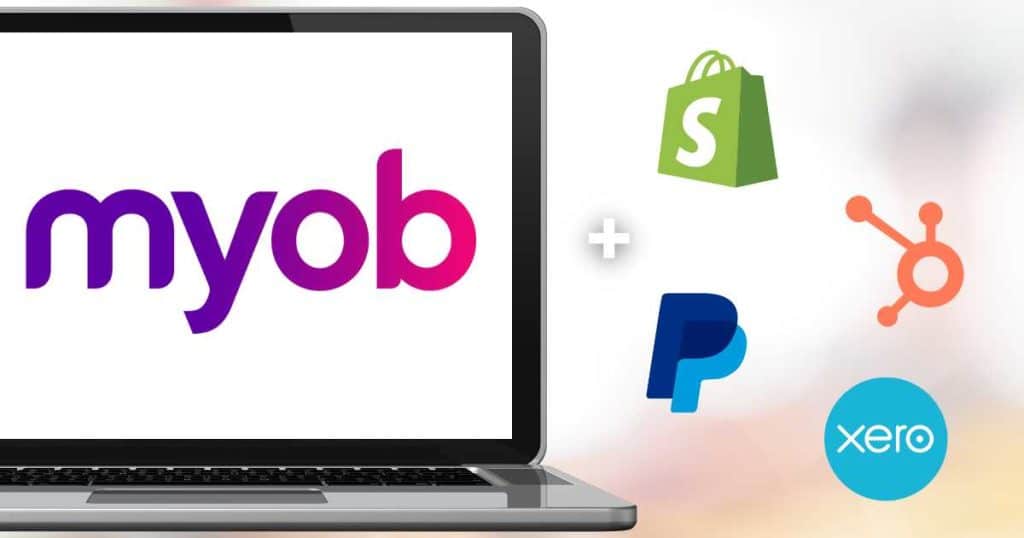
Thanks to its growing list of 350+ third-party integrations, MYOB can turn your accounting software into a fully functional business management platform!
Running an eCommerce store with Shopify? Simply connect MYOB with your Shopify Store to automatically sync sales, track inventory, and stay on top of orders.
And if you need smooth, secure online payments, MYOB seamlessly integrates with PayPal!
Integrations with popular CRM software such as HubSpot are also possible for businesses looking to level up their customer relationships.
You can even pair MYOB with Xero to offer flexible options to bridge accounting workflows.
By integrating with your current tech stack, MYOB (alongside your favorite tools) can help you streamline and optimize your entire business!
Read more: Top 5 Best Xero Alternatives.
Which Countries Use MYOB?
MYOB is proudly built with Australian businesses in mind, and it shows!
It comes packed with region-specific tools, including support for local GST/VAT rules, Single Touch Payroll (STP) for Australia, and integration with local banks and payment providers.
All data is also securely hosted on Australian servers to meet regional data residency standards, and support is provided by local teams.
So, can you use MYOB if you don’t operate in Australia?
Yes! There are plenty of other non-Australian businesses that use MYOB, including companies from the United States, Singapore, and New Zealand.
However, it’s important to remember that those operating outside Australia may find the software less tailored to their local tax laws, currencies, and financial systems.
Top 3 MYOB Alternatives
While MYOB is a solid choice for many businesses, it’s not the only player in the game!
Here are three powerful alternatives that rival MYOB (and might be a better accounting fit for your small business needs):
1. Xero
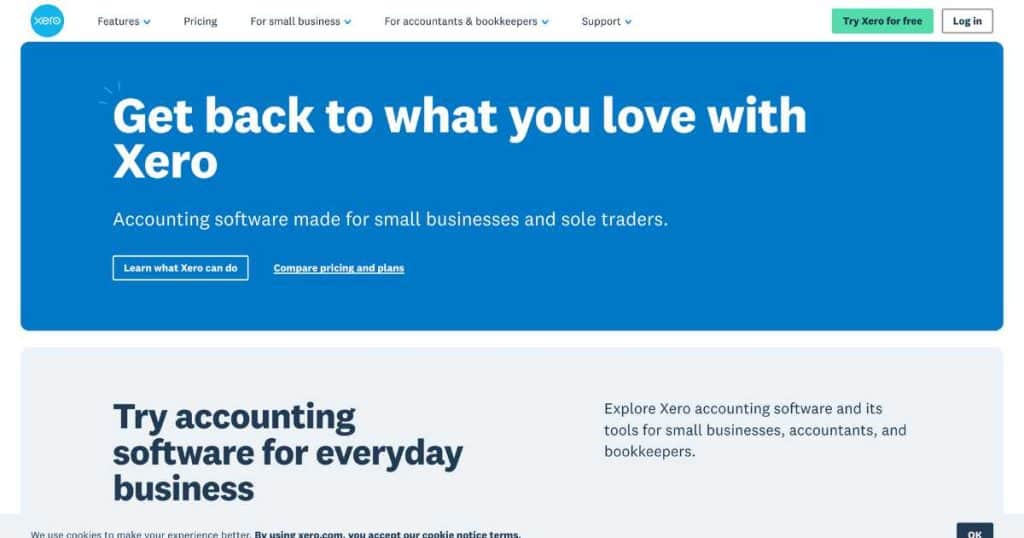
I’m sure you’ve heard of Xero, one of MYOB’s biggest business accounting competitors.
Both MYOB and Xero offer a range of features that make financial management easier for small and medium-sized businesses.
At first glance, they appear quite similar, with both platforms providing essential tools like invoicing, payroll, bank reconciliation, inventory tracking, and GST reporting.
They also both support strong bank integrations and expense management, giving business owners real-time visibility of their finances.
However, when getting into the specifics, the experience of using each platform can be quite different!
Xero is praised for its clean, modern, minimalist interface and user-friendly dashboard, which makes it ideal for newbies.
It also connects with over 1,000 third-party tools, making it a powerhouse for customization.
And its mobile app and collaboration features give it an edge for those on the go!
On the flip side, MYOB has carved out a reputation for offering comprehensive payroll and inventory features, and it delivers!
This makes it a strong choice for larger businesses with more complex operational needs, such as multi-locational stock management.
MYOB’s interface certainly isn’t as intuitive as Xero’s. However, recent updates have made it more user-friendly.
Pricing-wise, both platforms use a tiered subscription model based on features and user numbers.
Xero is generally more upfront with its costs, while MYOB’s pricing can vary depending on which features you need.
For example, their payroll features come at an additional cost (depending on the plan).
Xero is likely the better fit if you’re after a sleek, flexible, and easy-to-learn platform with excellent app integrations.
But MYOB might be the smarter investment if your operations involve more complex payroll and inventory systems.
Want to learn more about Xero? Check out my ultimate Xero review here.
2. QuickBooks
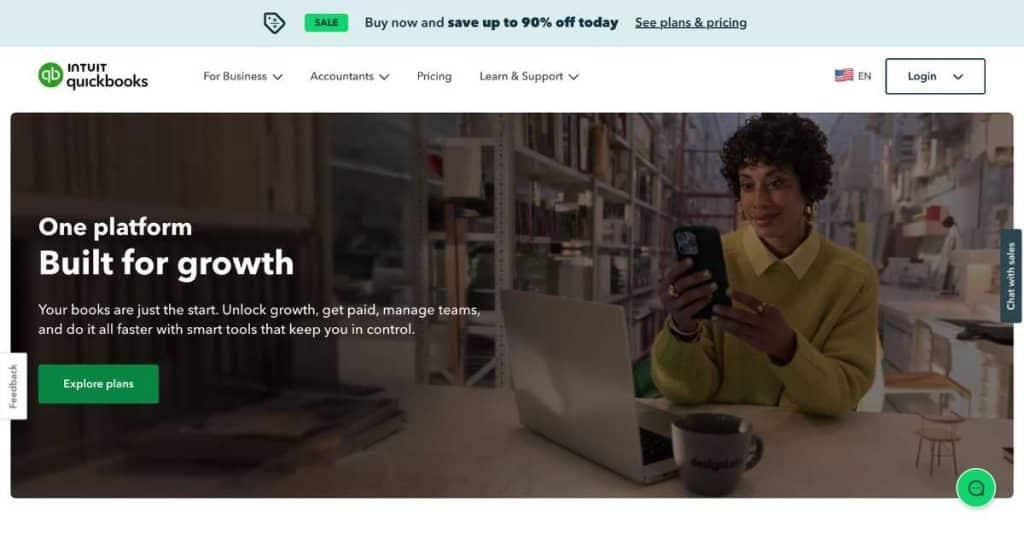
QuickBooks and MYOB are two accounting software with a lot in common!
Backed by decades of experience in the bookkeeping and accounting space (both built initially as desktop platforms), each has evolved into a modern cloud-based solution.
And while both offer the essentials like invoicing, expense tracking, payroll, and financial reports, there are some essential differences.
QuickBooks has built a reputation for being exceptionally user-friendly, catering to small and medium-sized businesses with its intuitive dashboard and innovative automation tools.
It also includes some handy features MYOB doesn’t offer, like mileage tracking and more customizable reporting dashboards.
With that said, MYOB takes the lead regarding payroll and inventory management features, making it ideal for teams with complex staff structures or product tracking needs.
In terms of pricing, MYOB is cheaper, particularly for startups.
QuickBooks plans range from $35-235 per month, while MYOB offers more affordable pricing across the board.
In saying that, QuickBooks does offer a budget-friendly ‘Solopreneur’ plan priced at $10 per month, tailored to sole traders.
But while this plan is more feature-rich than MYOB’s solo equivalent, it still comes in at over double the cost!
So, which one’s right for you? QuickBooks might be worth the extra spend if you’re looking for ease of use, flexible reporting, and extras like mileage tracking.
But MYOB delivers impressive value if your business requires more robust operations, especially around payroll and inventory.
Read more: Xero vs QuickBooks.
3. Sheetify Bookkeeping
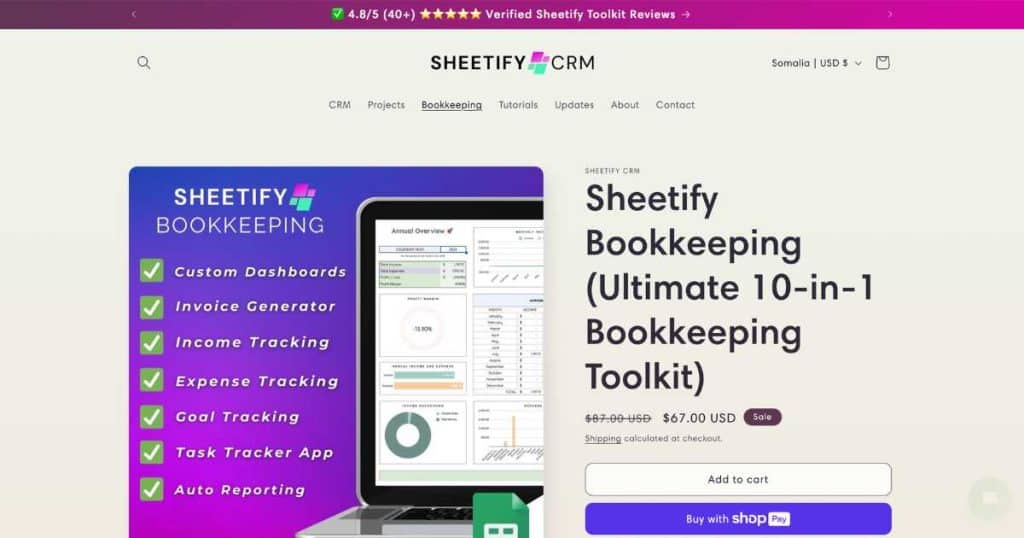
While MYOB is a trustworthy all-in-one solution, what if you don’t actually need a comprehensive accounting software package?
Enter…..Sheetify Bookkeeping.
Ideal for freelancers, sole traders, or very small teams, Sheetify Bookkeeping offers a more hands-on, customizable approach to tracking income, expenses, and basic cash flow.
Compared with MYOB, Sheetify Bookkeeping shares many features, such as income and expense tracking, invoice creation, and financial reporting.
This means small business owners can effectively manage their finances without the steep learning curve!
However, there are a few differences between Sheetify Bookkeeping and MYOB.
If you’re looking for advanced built-in features such as payroll, timesheets, inventory management, and third-party integrations, MYOB is the better choice.
But if you’re after a lightweight, spreadsheet-based alternative aimed at simplicity and affordability, Sheetify Bookkeeping is the ultimate solution!
In terms of usability, Sheetify Bookkeeping is super simple to use, but it’s only available for free or paid Google Workspace users (as it’s a Google Sheets product).
On the other hand, as a cloud-based solution, MYOB can be used by any small business.
Sheetify Bookkeeping is a much more affordable option, with a one-time payment of $67 that grants you lifetime access to all Sheetify features and tools.
Basically, if you’re a small business comfortable with spreadsheets and Google products, Sheetify Bookkeeping is the perfect, functional yet straightforward bookkeeping solution.
However, if you’re searching for the perfect all-in-one, scalable accounting system with comprehensive finance tools and features, MYOB is a strong contender.
Is MYOB Still a Good Accounting Software?
In an overpopulated accounting market filled with sleek alternatives like Xero, QuickBooks, and Sheetify Bookkeeping, you might be wondering….does MYOB still hold its ground?
And for many small businesses, the answer is still yes
While it doesn’t have the flashiest interface, MYOB delivers substance where it counts, with impressive compliance, payroll, inventory, and expense management tools.
MYOB has also adapted with the times, transforming from a traditional desktop-based product into a fully cloud-based, modern financial management solution.
And unlike some newer platforms that prioritize simplicity over depth, MYOB strikes a balance between ease of use and advanced functionality.
It’s especially appealing for growing Australian businesses that need scalable solutions!
MYOB is a seriously feature-rich all-in-one accounting option for small businesses wanting more than basic bookkeeping.
Stews Final Thoughts
And that’s it for this MYOB accounting software review!
So, is MYOB the best bookkeeping software for your business?
In my opinion, MYOB still remains a strong contender, especially for small businesses that need built-in payroll, inventory management, and local compliance support.
That said, despite its strong features, ease of use, and plan flexibility, MYOB might not be the right fit for you, and that’s okay!
There’s no minimum subscription period or lock-in contracts, so I recommend trying the platform for a month or two to see how it handles your day-to-day accounting needs.
Only then can you truly decide if MYOB is the best solution for your business.
Thanks so much for reading this MYOB accounting software review!
